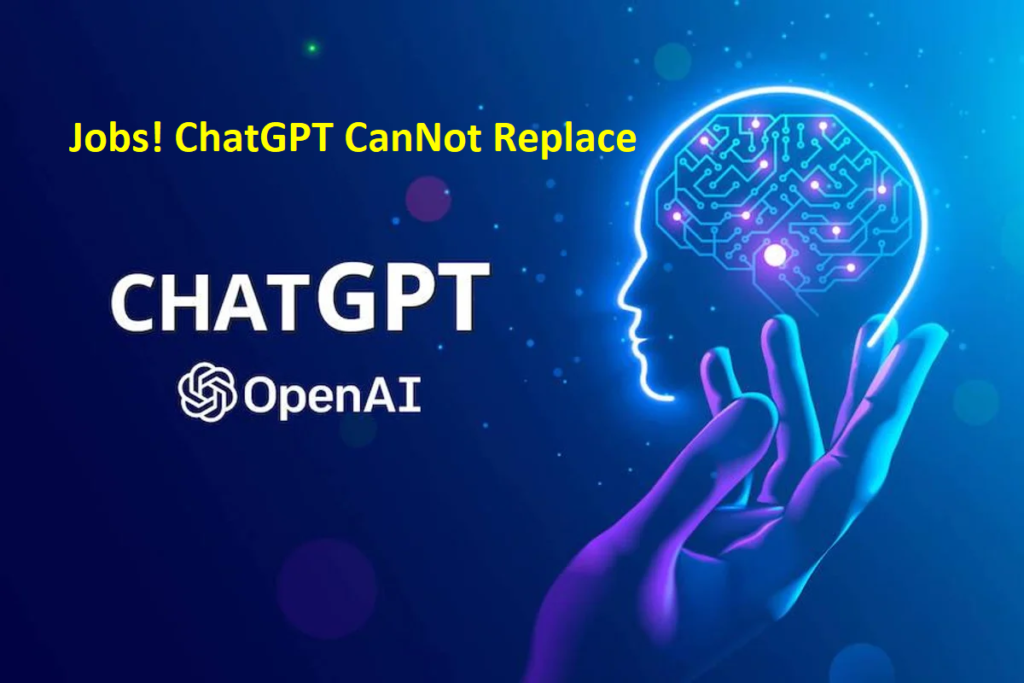Jobs! ChatGPT Cannot Replace

As technology continues to evolve, there is growing concern about job displacement due to advancements in AI and natural language processing. However, it is crucial to recognize that certain professions require unique skills, creativity, and empathy that only humans can provide. While chatbot technologies like ChatGPT have made impressive strides in understanding and generating human-like text, there are several professions in which the unique skills and human touch remain invaluable.
AI can perform repetitive tasks better than humans, as humans can easily get bored and require support from AI tools to stay creative and engaged. The print media often tends to focus on the negative aspects of AI tools, spreading negativity about them potentially replacing human jobs. However, it is important to look at the other side of the coin and give humans an opportunity to focus on creativity. Currently, most bots perform basic tasks without utilizing their intelligence to empathize with customers.
In contrast, the IT world has established a common language and terminology for their tools and technology. Unfortunately, there is no standard language or terminology for customers, which is where humans can offer their assistance.
We will explore jobs that are unlikely to be fully replaced by chatbots. Rather than fearing automation, let us focus on leveraging it to enhance our capabilities and save individuals from unnecessary anxiety about job security.
Product Manager: A product manager is the driving force behind successful product development. They possess a deep understanding of customer needs, market trends, and business strategy. While chatbots can collect user feedback and analyze data, they lack the human touch required to empathize with customers and make critical product decisions. For example, a product manager can envision a groundbreaking mobile application by combining user insights, market analysis, and creative problem-solving. This level of human ingenuity and strategic thinking cannot be replicated by chatbots.
Cyber Security Analyst: In an increasingly interconnected world, cyber threats pose significant risks to organizations. Cyber security analysts play a crucial role in protecting sensitive data, detecting vulnerabilities, and developing robust security measures. While chatbots can assist in certain tasks, such as monitoring network activity or generating reports, the complex nature of cyber threats demands human expertise. Cyber security analysts possess the skills to anticipate evolving threats, conduct in-depth investigations, and devise effective defense strategies, which go beyond the capabilities of chatbots.
Developer/Programmers: Developers and programmers are the architects of the digital age, creating and maintaining software applications that power our lives. While chatbots can automate certain repetitive coding tasks, they cannot replace the creativity, problem-solving, and critical thinking abilities of human developers. Skilled developers possess deep knowledge of programming languages, algorithms, and software architecture, enabling them to craft sophisticated solutions tailored to specific requirements.
Data Scientist: Data scientists are invaluable in the era of big data. They possess expertise in statistical analysis, machine learning, and data visualization, enabling them to extract meaningful insights and drive data-driven decision-making. While chatbots can assist in analyzing structured data, the complexities of unstructured and complex datasets require the intuition, domain expertise, and analytical prowess of human data scientists. They uncover patterns, generate actionable recommendations, and discover hidden opportunities that propel businesses forward.
IT Consultant: The expertise of IT Consultants plays a pivotal role in helping organizations leverage technology to achieve their strategic objectives. These professionals excel in understanding organizational needs, recommending suitable solutions, and managing implementation processes. Imagine an IT Consultant engaged by a manufacturing company to streamline their supply chain operations. They assess existing systems, identify inefficiencies, propose technological upgrades, and oversee the successful integration of new software and hardware, leading to increased efficiency and profitability.
Account Manager: Account Managers play a crucial role in fostering long-term relationships with clients, understanding their needs, and ensuring their satisfaction. These professionals possess strong interpersonal and communication skills. Imagine an Account Manager working for a digital marketing agency. They establish trust, align marketing strategies with client goals, coordinate campaign execution, and deliver regular performance reports, ultimately driving client retention and business growth.
Program & Project Manager: Program and Project Managers are responsible for overseeing complex initiatives, coordinating resources, managing timelines, and ensuring successful outcomes. Consider a Program Manager overseeing the implementation of a city-wide transportation system. They collaborate with multiple stakeholders, allocate resources efficiently, manage risks, and ensure timely delivery, thereby contributing to the smooth functioning of public transportation for millions of commuters.
Data Entry operator: Data entry operators are responsible for accurately inputting and organizing data into computer systems. While chatbots can automate certain repetitive tasks, the role of a data entry operator often involves dealing with unstructured data, verifying accuracy, and resolving discrepancies. Human judgment and contextual understanding are crucial for ensuring data quality and making sense of ambiguous or incomplete information.
Career Counselors: The path to a fulfilling career is often filled with uncertainties, doubts, and difficult decisions. This is where the role of a career counselor becomes invaluable. While chatbots can provide general career information or answer basic queries, they cannot replace the human element of counseling. Career counselors possess the ability to actively listen, empathize, and provide personalized guidance tailored to an individual’s unique circumstances and aspirations.
Psychologist: Mental health support requires a delicate balance of scientific knowledge, empathy, and human connection. While chatbots may offer some level of emotional support or basic information, the complexities of human emotions, individual experiences, and therapeutic interventions demand the presence of a trained psychologist. AI-driven chatbots lack the ability to fully comprehend and address the nuanced challenges individuals face.
Leadership Roles: The responsibilities of CEOs and board executives extend beyond decision-making and leadership. They set the strategic direction of an organization, manage relationships, and drive long-term success. While AI and chatbots can provide data-driven insights and assist in operational tasks, the ability to navigate complex business landscapes, foster innovation, and build relationships with stakeholders requires human judgment, vision, and emotional intelligence.
Consider a visionary CEO leading a technology company. They possess the ability to identify emerging trends, anticipate market shifts, and steer the organization towards future success. By nurturing a culture of innovation, fostering collaboration among teams, and building relationships with clients and partners, the CEO plays a critical role in driving the company’s growth. These skills go far beyond what AI and chatbots can currently achieve, emphasizing the indispensable nature of human leadership in the business world.
By harnessing our human potential, embracing collaboration with AI, and focusing on continuous learning and development, we can forge a future that thrives on innovation, sustains meaningful employment, and preserves the essence of our critical professions. The key lies in understanding that while AI augments our capabilities, it is the distinct qualities and creative problem-solving skills of humans that are truly irreplaceable.
The ideology that AI tools will kill humans stems from the notion that everything will look the same if AI is implemented everywhere, thus stifling creativity and livelihood. However, the role of AI should be seen as a tool to enhance and improve human work, rather than replacing humans altogether.






